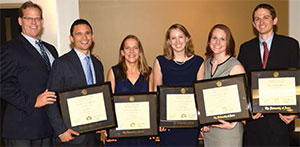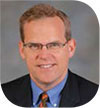We are all excited to welcome you into ophthalmology! Our profession is rewarding – it will challenge you for your entire career. You will have opportunities to give back to your patients, hospital, community and even the world. Starting off as a resident is a daunting task. You must have so many questions buzzing through your mind. I will address four really common ones.
What makes a great resident great?

(Left to Right) Residency Director, Thomas A. Oetting, MD, with University of Iowa residents Justin Risma, MD; Angela McAlister, MD; Pavlina Kemp, MD; Elizabeth Gauger, MD; and Matthew Weed, MD.
A great ophthalmology resident is hard to define, but when you see one, you know it. A great resident has infectious enthusiasm for our profession and the science of the eye. She enjoys working with patients and always wants more clinical and surgical opportunities with chances to learn. A great resident makes our patients feel cared for and special. He learns from his mistakes and moves on. Great teachers, great residents create a sea of medical students interested in ophthalmology. A great resident gets things done when she said she would with no fanfare: notes, work hour requests, faculty evaluations and other important administrative jobs. He adds value to the faculty, department, hospital and community. A great resident gives more than he or she takes. And like a good camper, a great resident leaves our program better than when he or she arrived.
What do I read?
Start reading as soon as you match–but what? Get the big picture first and fill in the details later. Imagine building a tree of ophthalmic knowledge with the branches first and adding the detailed leaves later. I love the strategy of our former resident, Toby Taylor (Knoxville, TN). Find an interesting picture in an atlas (e.g., EyeRounds.org or Spaltons), such as herpes keratitis, and then use the Wills Eye Manual to attach a practical strategy to each disease. Keep it fun and practical at first. Get images in your mind. Get an idea of the differential diagnosis and basic therapy options. After you go through the atlas/Wills a few times, then move into the basic science manuals and fill in the details.
How do I get my hands going – will I be a good surgeon?
I have helped a bunch of residents through their first case and then watched them develop. Some start fast, some start slow. Some flatten out after 50 cases and don’t improve much and some improve until their very last case. But everybody seems to make it. If you happen to be a slow starter (like me 25 years ago), don’t give up in despair. You may well finish residency as a great surgeon with a rapid learning curve at the end.
As you learn surgery, you put your patients at risk. Tough truth. Deal with it! The question is how to limit that risk and add value to the patient who has agreed to let you operate on them. In most programs the surgery comes in the third year. But I suggest starting from the beginning of residency, getting both hands going under the microscope in your practice lab, minor room or OR. Suture, phaco or write your name on rice. Just get those hands and eyes synched up under the scope. Use both hands. Assist as much as you can. Take your program’s organized wet lab and simulation sessions seriously. Structured learning limits your risk to our patients.
How do I budget my time?
This is the hardest question in life. Spouse, kids, family, fitness, health, hobbies, training – something has to give. No one can do it all, not even you. You have to sort it out day by day. Be efficient and read every day. Maybe combine reading with the treadmill (wish I did that). You may have to give up reality TV (harsh). For some the best time will be when your spouse or kids are sleeping. For others the best place to read might be in the department early in the day or after the day is done. The unwavering truth is that several real and important milestones come up during this first year of residency. The first is seeing a patient in clinic with close supervision. The second is seeing a patient all by your lonesome on first call. The third is taking the OKAP exam. These milestones are coming and preparation has to be a high priority. You can do it!
We are fortunate to have the brightest medical students join our programs. Enjoy your residency, treasure your patients, and add value to your program and our profession.
* * *
 About the author: Thomas Oetting, MD, is currently a professor of clinical ophthalmology and the residency program director at the University of Iowa. He serves as chief of ophthalmology and deputy director for surgery at the Iowa City VAMC. Dr. Oetting has won the University of Iowa’s Resident Teaching Award five times. He writes and lectures on cataract surgery and medical education.
About the author: Thomas Oetting, MD, is currently a professor of clinical ophthalmology and the residency program director at the University of Iowa. He serves as chief of ophthalmology and deputy director for surgery at the Iowa City VAMC. Dr. Oetting has won the University of Iowa’s Resident Teaching Award five times. He writes and lectures on cataract surgery and medical education.